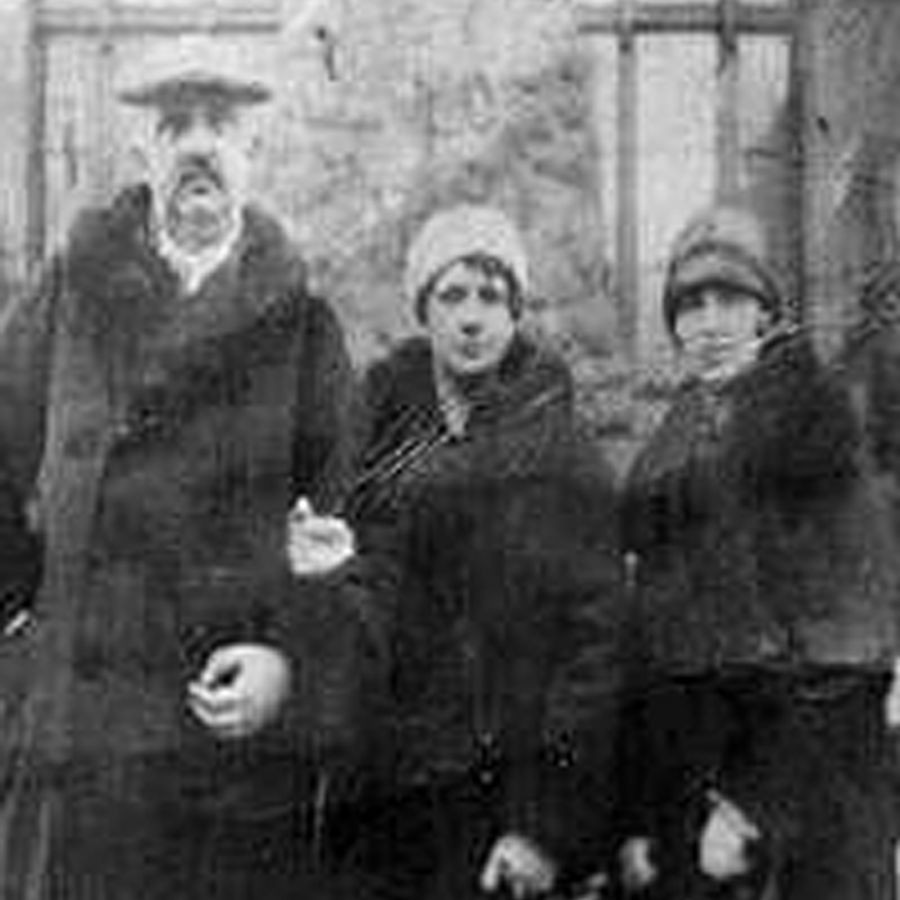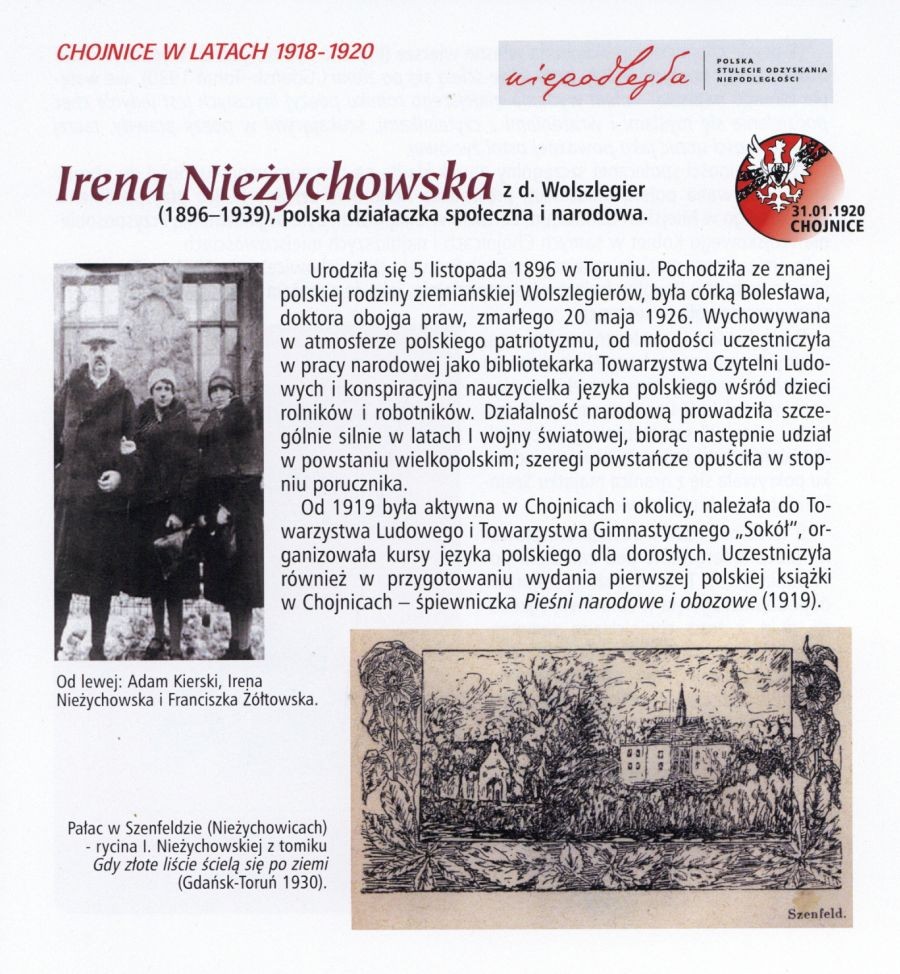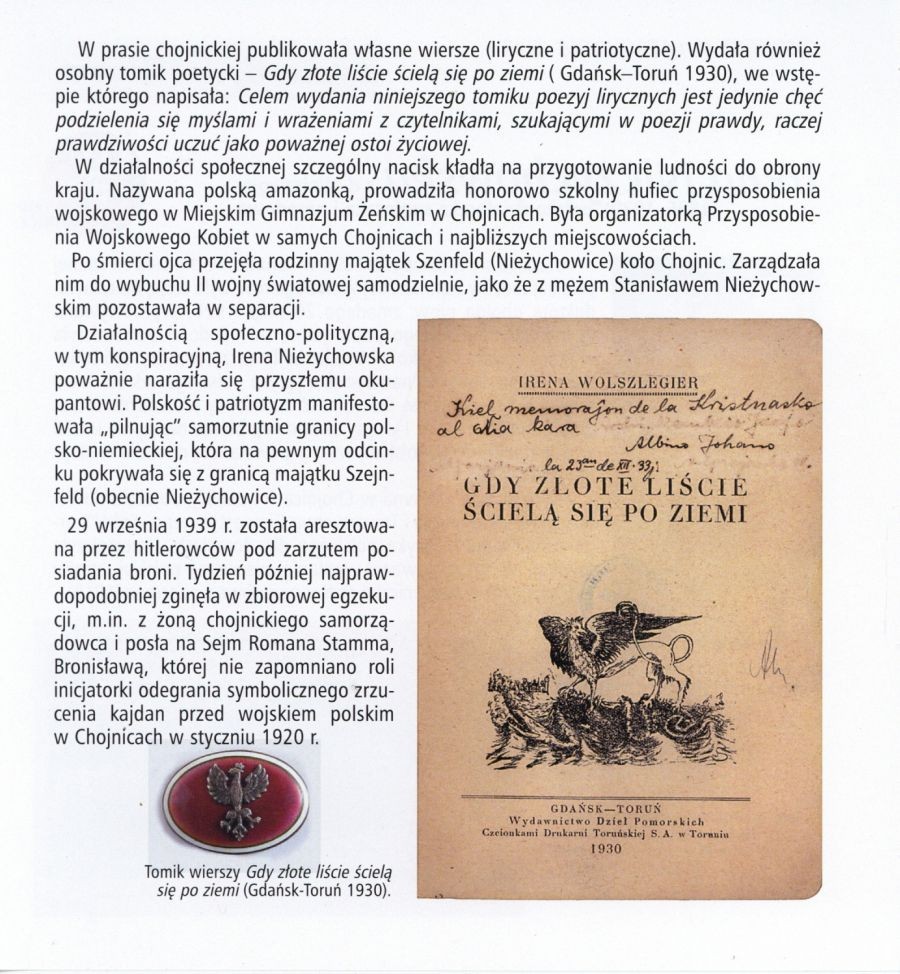
Irena Nieżychowska - Wolszlegier (1896-1939), landowner, social and national activist, organiser of defence preparations
Irena Nieżychowska is remembered for her patriotic attitude and social activities. For this reason, her family village near Chojnice, where she was heiress to a landed estate in the interwar period, was named after her.
She came from a well-known Pomeranian landowning family, the Wolszlegier family, whose subsequent generations clung to Polishness throughout the Prussian partition. She was born on 5 November 1896 in Toruń. She was the daughter of Bolesław (1850-1926), born in Szenfeld (Nieżychowice), a doctor of both laws. Her father, on the return of Pomerania to a reborn Poland on 10 February 1920, was appointed commissioner president of Toruń, a post he held until 20 May 1921. His brothers Władysław and Antoni were prominent Polish national activists. They represented the Polish population in the German parliament.
rom an early age, Irena Wolszlegier was brought up in an atmosphere of Polish patriotism. From a young age, she put herself to work in the national field. She took up a job as a librarian with the Towarzystwo Czytelni Ludowych (Society of People's Readers). She conducted clandestine teaching of the Polish language among the children of farmers and workers. She was particularly active during the First World War. She took part in the Wielkopolska Uprising, leaving the ranks of the insurgents with the rank of lieutenant. She distinguished herself by her courage and talent as a commander. She married Stanisław Nieżychowski, with whom, however, she remained separated after a short marriage.
In 1919, due to the death of her uncle Władysław, she settled in Szenfeld and immediately joined the current of public life in Chojnice and the surrounding area. The Polish population, which remained in the minority, was diligently preparing to take over the administrative authorities and all institutions from the Germans. Irena Nieżychowska was an active participant in this process. She was a member of the People's Society and the ‘Sokół’ Gymnastic Society, and she also organised a Polish language course for adults. She took part in the preparation of the songbook ‘Pieśni narodowych i obozowych’ (‘National and Camp Songs’) (1919) by Władysława Wolszlegier - Obertyńska. She herself also wrote patriotic poems, which cannot be denied artistic value. She published them in the local Chojnice newspapers, and they were also published in a separate poetry volume, ‘When golden leaves strew themselves on the ground’ in 1930.
After the deaths of Władysław (1919) and Antoni (1922), their brother, Bolesław Wolszlegier, Irena's father, became heir to the Szenfeld estate. When he died in 1926, she took over independent management of the estate. The lands of the inherited estate were adjacent to the Polish-German border in a certain section, which Nieżychowska used to manifest her beliefs by independently ‘guarding’ the border line. She was referred to as the ‘Polish Amazon’ because she loved to ride on horseback. While touring her estate, she more than once requisitioned German cattle that were illegally grazing on the Polish side of the border in the fields and meadows of her estate.
She was an organiser and instructor of Women's Military Training circles in Chojnice and the surrounding area. In the 1930s, she was an honorary leader of the school's military training troop in the Municipal Female Gymnasium. Irena Nieżychowska's patriotic attitude posed a huge problem for the local German population. After Hitler's invasion of Poland, her name was on the Selbstchutz proscription list. On 29 September 1939 she was arrested by the Gestapo on suspicion of possessing weapons and on 5 October she was deported with other suspected citizens towards Bydgoszcz. The prisoners were imprisoned in the basement of the barracks, and a week later she was probably killed in a mass execution.
After the war, the Wolszlegier family's landed estate in Szenfeld was nationalised, operated as a State Agricultural Farm and was then handed over to the Plant Breeding and Acclimatisation Institute in Banin.
The Chojnice community remembered Irena Nieżychowska for her uncompromising patriotism, for which she paid the highest price.
More information about Irena Wolszlegier - Nieżychowska can be found in the following publications: ‘Pamięci godni. Chojnicki słownik biograficzny 1275-1980’ by Zbigniew Stromski, “Zeszyty Chojnickie V” of 1970, ’Poczet zasłużonych Chojniczan. A biographical dictionary of the 20th century’ by Kazimierz Ostrowski, as well as in the 1980 guidebook “Bazuny”.

